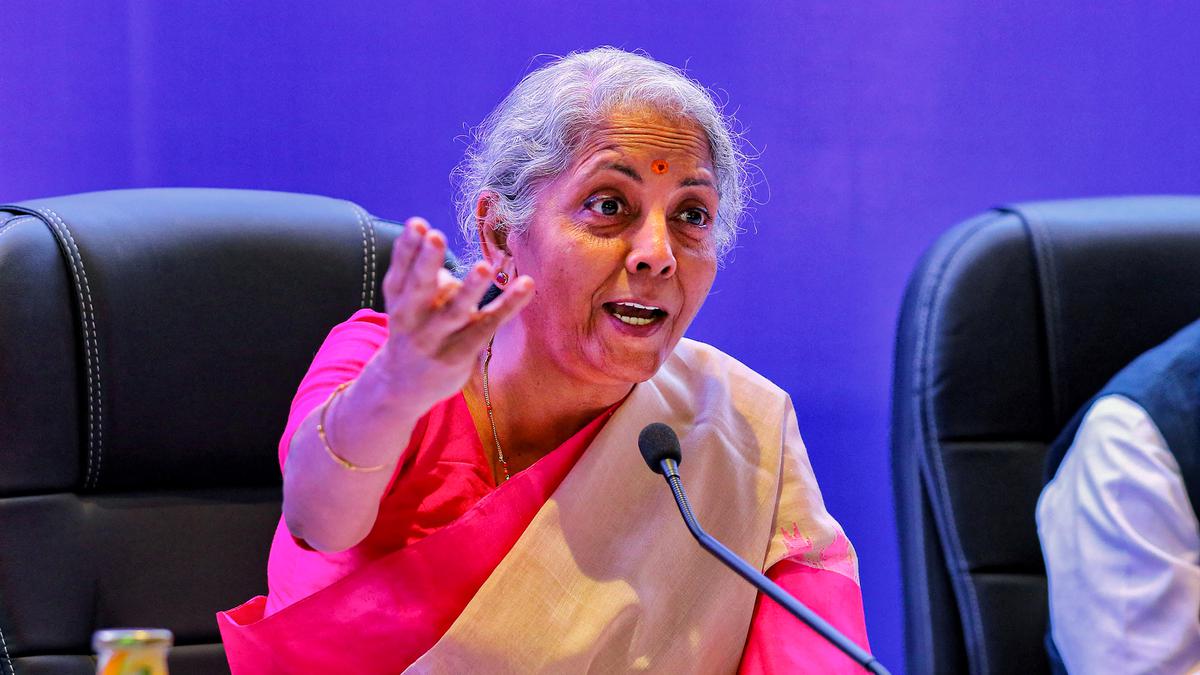Union Finance Minister Nirmala Sitharaman addresses a press conference on Union Budget 2023-24, in Jaipur on February 20, 2023.
| Photo Credit: PTI
The measures like increased capex, boosting the green economy and initiatives for strengthening financial markets announced in the Budget 2023-24 are expected to promote job creation and spur economic growth, the Finance Ministry said on Thursday.
In its Monthly Economic Review, the Ministry said during the December 2022 quarter, various High-Frequency Indicators (HFIs) pointed towards a slowdown in general, as monetary tightening appeared to have started weakening global demand.
“This may continue in 2023 as various agencies have forecasted a decline in global growth. Apart from the lagged impact of monetary tightening, the uncertainties emanating from the lingering pandemic and relentless conflict in Europe may further dampen global growth,” it noted.
Even as global output is expected to slow, the IMF and World Bank project India to be the fastest-growing major economy in 2023.
“As in 2022-23, India faces the coming financial year with confidence imparted by underlying and overall macroeconomic stability while being on the alert against geo-political and geo-economic risks,” the monthly review said.
The Economic Survey 2022-23, tabled in Parliament ahead of the Budget, had pencilled in a growth rate of 6.5% for FY24 but with more downside than upside risks, it added.
“Inflation risks are likely to be lower for India in FY24. Still, they will not have vanished as global conditions, such as geopolitical conflicts and consequent supply disruptions that contributed to higher inflation in 2022 are still present,” it said.
Predictions of a return of El Nino conditions in the Pacific could presage a weaker monsoon in India, resulting in lower output and higher prices. Similarly, as with prices, external deficits may be a lesser challenge in FY24 than in FY23, but close attention to trends in international trade and capital flows will be warranted.
The 2023-24 Budget has yet again provided a capex stimulus to growth by increasing the Centre’s capex budget to ₹10 lakh crore — 33% higher than the previous year.
“By doing this, the Government is continuing its push towards investment-driven growth amid global headwinds…The measures announced in the Union Budget FY24, such as a rise in capital expenditure, increased focus on infrastructure development, boost to the green economy, and initiatives for strengthening financial markets etc., are expected to promote job creation and spur economic growth,” it said.
The Budget FY24 has also announced measures to increase spending and consumer demand. These include the rationalisation of tax slabs and an increase in the basic exemption limit from ₹2.5 lakh to ₹3 lakh under the New Personal Income Tax Regime (NPITR).
“The Union Budget has further introduced important process measures, such as the setting up of the National Financial Information Registry, the implementation of a single window system, and reforms in property-tax governance, among others.
“These will improve processes in the financial market and, in turn, enable regulators to create a more effective feedback mechanism to review regulations,” the Ministry’s monthly review report said.
The steps announced in the Union Budget FY24 will sustain the growth momentum that has characterised the Indian economy in the current year while aiding in addressing inflationary pressures. Even though the Consumer Price Index (CPI) inflation rose to 6.5% in January 2023, headline inflation in India has been showing a downward trend in the second half of FY22, it added.
Measures announced for the MSME sector will likely reduce the cost of funds and aid small enterprises. Revision in tax slabs under the New Personal Income Tax Regime is expected to boost consumption, thus providing more impetus to economic growth. Easier KYC norms, expansion of DigiLocker services, and overall impetus on digitisation and last-mile connectivity are predicted to strengthen financial markets, the report said.
“Thanks to the emphasis on macroeconomic stability in the last several years, the Indian economy faces the year ahead with confidence while being mindful of the risks,” it added.




